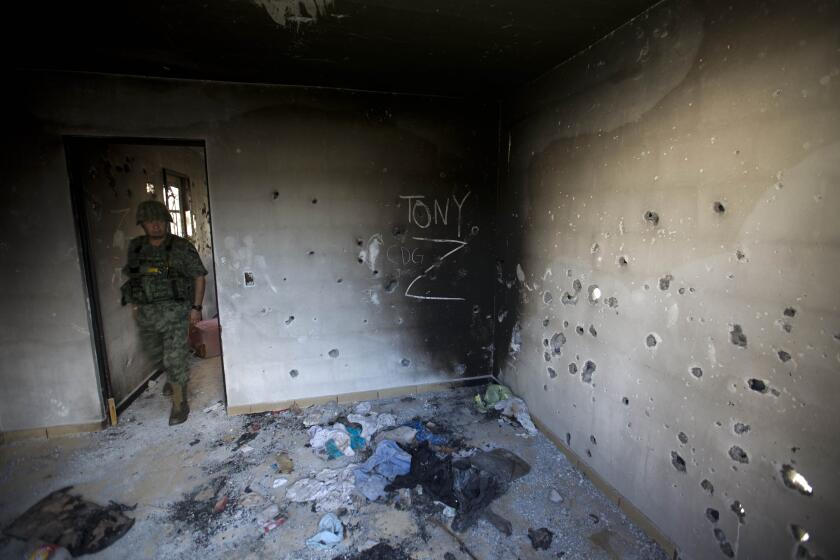International Signal Code Salutes Changing Times
My old colleague Ray Hebert, former urban affairs writer of The Times, has retired to Carlsbad, where he evidently has time to think about changes that have taken place since his youth.
Recently Ray and his wife, Joan, took a trip up the coast to Astoria, Ore., where they visited the Columbia River Maritime Museum. As a one-time merchant seaman, Ray was pleased to find in the museum almost everything one might want to know about the sea.
But he found that there have been changes he considers shocking, or at best incomprehensible, in the international signal code alphabet. That is a matter of esoteric interest, I concede, but knowing that I was also in the merchant marine, he asked for my opinion.
It seems to me that some of the changes Hebert notes are a part of the general deterioration of the language in this technological age.
There seems to be less and less respect for the simple words that used to do so much work. For example, effect is no longer effective; the new word is impact .
Hebert reports that the new code words for signal flags and letters of the alphabet are Alpha, Bravo, Charlie, Delta, Echo, Foxtrot, Golf, Hotel, India, Juliet, Kilo, Lima, Mike, November, Oscar, Papa, Quebec, Romeo, Sierra, Tango, Uniform, Victor, Whiskey, X-Ray, Yankee and Zulu .
Checking the “American Merchant Seaman’s Manual” issued to him in April, 1942, he found that the code words then were Affirm, Baker, Cast, Dog, Easy, Fox, George, Hypo, Interrogatory, Jig, King, Love, Mike, Negative, Option, Preparatory, Queen, Roger, Sail, Tare, Unit, Victor, William, X-Ray, Yoke and Zed .
Hebert notes, in bafflement, that only three words have survived intact-- Mike, Victor and X-Ray . “I was fascinated,” he says. “What line of thinking led to changing Roger to Romeo, and what possessed them to drop Love in favor of Lima or Queen for Quebec ? (And why does) the Fox flag unaccountably become Foxtrot ?”
Although I cannot understand half-billion-dollar bombers and other military extravagances, I will try to comprehend the Pentagon’s whimsy at the simple level of word use.
I do think Charlie is an improvement over Cast ; but Delta is no improvement over Dog.
I think we used Dog when I was in the Marine Corps, back in 1943. Dog was unmistakable. (“ Dog to Easy . This is Dog calling Easy. Come in Easy .” What could be simpler?) But perhaps November was substituted for Negative because Negative might be mistaken for a message, meaning “no” or “none.”
Likewise, Roger may have given way to Romeo because Roger also has a meaning of its own, apart from being the code word for R . I grant that Zulu is more recognizable than Zed, but why Sierra over Sail , why Hotel over Hypo, Echo over Easy, Lima over Love, Kilo over King?
I agree that Oscar is better than Option and India is better than Interrogatory (but why not Ink ?), but how does Bravo improve on Baker ?
OK, Whiskey is better than William , and Tango is certainly better than Tare, whatever that meant. And Yankee is better than Yoke. But why Golf instead of George ?
There may be a clue in the fact that all the new words (except Golf and Mike ) are at least two syllables, replacing such one-syllable words as Cast, Dog, Fox, Jig, King, Love, Queen, Sail, Yoke and Zed. Is a two-syllable word less likely to be misunderstood?
Most of us will never have to worry about these codes. But it makes me uncomfortable to think that the U.S. Navy is tampering with its hallowed traditions for no apparent reason.
In the Navy, tradition is paramount.
I called the Marine Corps and talked to a Gunnery Sgt. Hill. I asked him if he could find out the current signal code words. “Know ‘em,” he said. He read them off without hesitation--” Alpha, Bravo, Charlie, Delta . . . “--right down the line, the new list as reported by Hebert.
“You have a remarkable memory,” I said. “Never forget ‘em,” he said. “In boot camp, we had to chant those words, over and over, on a 17-mile march.”
From another noncommissioned officer I learned that the Corps changed its system from the old “Baker, Dog, Easy” during or after the Korean War.
Anyway, boot camp hasn’t changed much.
More to Read
Sign up for Essential California
The most important California stories and recommendations in your inbox every morning.
You may occasionally receive promotional content from the Los Angeles Times.








